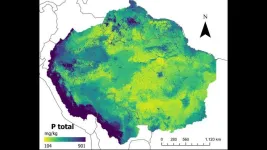The mission of the AAAS is to “advance science, engineering, and innovation throughout the world for the benefit of all.” Each year, AAAS elects fellows whose “efforts… are scientifically or socially distinguished.”
Over RPI’s 200-year history, 70 RPI faculty members have been elected AAAS Fellows.
“Being elected a AAAS Fellow is one of the highest honors of one’s research and academic career. It means your field and your peers recognize your outstanding impact on your discipline,” said RPI President Martin A. Schmidt. “Now, in our bicentennial year, these three honorees continue RPI’s proud tradition of AAAS participation going back to the American Industrial Revolution, when Henry Nason and Palmer Ricketts became some of the very first from RPI to earn the distinction.”
Szymanski is being honored for “distinguished contributions to the field of network science, especially social networks and computer networks.” Wang is being honored for “distinguished contributions to the field of structural biology, particularly to intrinsically disordered proteins and macromolecular interactions in Alzheimer’s disease and cancer.” Cramer, recognized by AAAS for “distinguished contributions to the field of chromatographic bioprocessing, achieved through combined experimental and computational approaches,” steps into a leadership role with council member status.
“It is a great honor to be recognized for my contribution to science by the American Association for Advancement of Science, publishers of Science magazine, and an organization celebrating its 150th anniversary this year,” Szymanski said.
“It is wonderful to be recognized by other AAAS Fellows,” said Wang. “I want to dedicate this honor to the past and current students, postdocs, and research staff members in my lab who struggled with me on many projects, papers, and grant applications. I also appreciate all of the support I have received at RPI for my independent researcher career, in particular my nominator and department chair, Susan Gilbert.”
“It’s a privilege to represent RPI in such a prestigious organization, first as a fellow and now as the sole representative of all engineering disciplines to the AAAS Governing Council, which makes many important decisions, such as election of Fellows, adoption of resolutions and statements on matters affecting the Association, election of affiliates, and approving amendments to the bylaws,” Cramer said.
At Rensselaer, Szymanski is the Claire and Roland Schmitt Distinguished Professor of Computer Science; professor of physics, applied physics, and astronomy; and director of the Network Science and Technology Center (NEST). Szymanski earned his Ph.D. in computer science from the National Academy of Sciences in Warsaw, Poland, in 1976. He has published over 400 scientific articles. Szymanski is a foreign member of the National Academy of Science in Poland, an Institute of Electrical and Electronics Engineers (IEEE) Fellow, a member of the IEEE Computer Society, and a member of the Association for Computing Machinery (ACM) for which he was national lecturer. He received the Wiley Distinguished Faculty Award in 2003 and the Wilkes Medal from the British Computer Society in 2009. His research interests cover the broad area of network science with a current focus on social and computer networks.
Wang is professor of biological sciences and chemistry and chemical biology at Rensselaer. Wang holds an M.D. from Peking Union Medical College and a Ph.D. in molecular biology and genetics from Cornell University. He is the recipient of the 2005 NYSTAR James D. Watson Award, the 2005 Alzheimer’s Association Young Investigator Award, and the 2010 Rensselaer School of Science Early Career Award. Wang is also the principal investigator of an NIA T32 training program.
Wang has about 20 years of experience in the study of structural biology of proteins involved in neurodegenerative diseases and cancer, such as amyloid-b peptide, tau, and Hedgehog protein. His research is fueled by numerous collaborations. Wang has made seminal discoveries in the molecular mechanisms of Alzheimer’s disease (AD), including the glycan determinants of heparan sulfate interaction with tau and ApoE. He has published over 110 scientific articles and has presented his work at over 80 venues. Recently, thanks to about $1.6 million in funding from the Warren Alpert Foundation, his group launched several drug discovery projects in AD. Wang’s work has been featured in multiple news outlets and he has mentored over 25 Ph.D. students and 10 postdoctoral researchers.
The researchers will receive certificates and rosettes to commemorate their AAAS Fellowship at the annual Fellows Forum in Washington, D.C. in September. The evening will also include a gala celebrating the 150th anniversary of the AAAS Fellows program at the National Building Museum.
“I am pleased that the prolific research of Professors Szymanski and Wang have earned them each this great honor,” said Curt Breneman, Ph.D., dean of Rensselaer’s School of Science. “Professor Szymanski has not only helped to advance network technology, but he has applied it to solve important problems in the fields of health care and social science. Professor Wang’s research is addressing the second most deadly disease and the leading cause of dementia. Their important work clearly deserves this recognition. They have both made us very proud of their accomplishments.”
Steven Cramer, NAE, chose to pursue the field of bioseparations, which plays an important role in drug biomanufacturing, after watching his father struggle with multiple sclerosis and wanting to make a difference in the then burgeoning biotechnology industry of the 1980s. Today, Cramer is one of three Institute Professors at Rensselaer, the highest honor bestowed on Rensselaer faculty, and a faculty member in the Isermann Department of Chemical and Biological Engineering, the Department of Biomedical Engineering, and the Department of Chemistry and Chemical Biology. He is also a member of the RPI Center for Biotechnology and Interdisciplinary Studies.
Cramer has won numerous awards from the American Chemical Society and RPI, and most recently received the Biotechnology and Bioengineering’s 2023 Gaden Award for work in development of a platform process for the production and purification of single-domain antibodies and was elected to the University of Texas at Austin academy of distinguished chemical engineers (the second non-alumnus to be granted this honor). He is a Fellow of the National Academy of Engineering, American Association for the Advancement of Science, the American Institute of Chemical Engineers, the American Chemical Society, and the American Institute for Medical and Biological Engineering. Cramer holds 11 patents and has published more than 230 papers in top peer-reviewed journals. Importantly, Cramer has graduated 57 doctoral students from his lab, many of whom now play key leadership roles in industrial bioprocessing as well as academia. Cramer’s accomplishments were recognized at a special symposium at the annual AIChE conference in 2023.
“Over his more than 37-year career, Professor Cramer has devoted himself to research, education, and mentorship that has moved the biotechnology industry forward. We are inspired by his dedication to using engineering to accelerate the next generation of pharmaceuticals that will transform how we treat disease,” said Shekhar Garde, Ph.D., dean of the RPI School of Engineering.
###
About Rensselaer Polytechnic Institute:
Founded in 1824 for the application of science to the common purposes of life, Rensselaer Polytechnic Institute is the first technological research university in the United States. Today, it is recognized as a premier university, noted for its robust and holistic learning community that connects creativity with science and technology. RPI is dedicated to inventing for the future, from shaping the scientists, engineers, technologists, architects, and entrepreneurs who will define what’s next for humanity, to research that bridges disciplines to solve the world's toughest problems. Learn more at rpi.edu.
For general inquiries: newsmedia@rpi.edu
Follow us on Twitter: @RPINews
END

